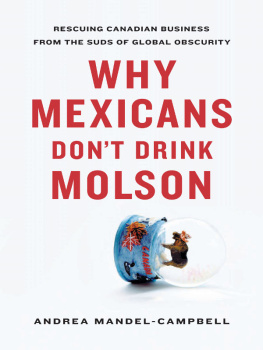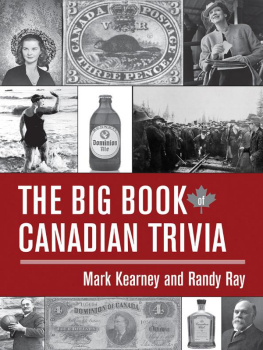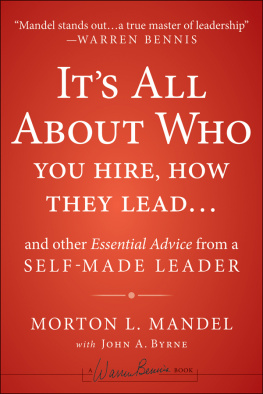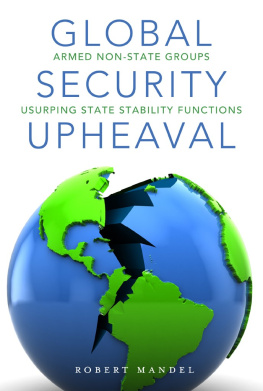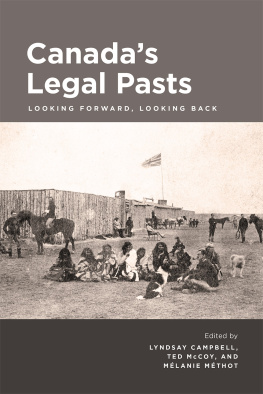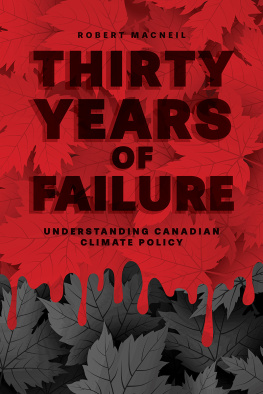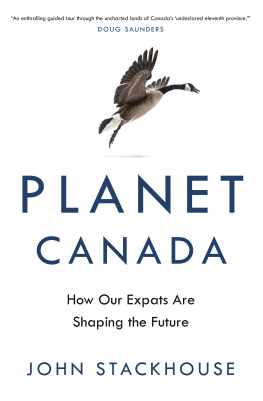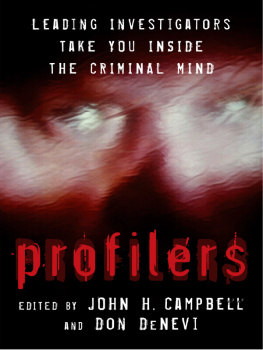WHY MEXICANS DONT DRINK MOLSON
RESCUING CANADIAN BUSINESS
FROM THE SUDS OF GLOBAL OBSCURITY
WHY
MEXICANS
DONT DRINK
MOLSON
ANDREA MANDEL-CAMPBELL
Douglas & McIntyre
Vancouver / Toronto
Copyright 2007 by Andrea Mandel-Campbell
07 08 09 10 11 5 4 3 2 1
All rights reserved. No part of this book may be reproduced, stored in a retrieval system or transmitted, in any form or by any means, without the prior written consent of the publisher or a licence from The Canadian Copyright Licensing Agency (Access Copyright). For a copyright licence, visit www.accesscopyright.ca or call toll free to 1-800-893-5777.
Douglas & McIntyre Ltd.
2323 Quebec Street, Suite 201
Vancouver, British Columbia
Canada V5T 4S7
www.douglas-mcintyre.com
Library and Archives Canada Cataloguing in Publication
Mandel-Campbell, Andrea, 1969
Why Mexicans dont drink Molson : rescuing Canadian business
from the suds of global obscurity / Andrea Mandel-Campbell.
Includes bibliographical references.
ISBN 978-1-55365-225-0
1. Competition Canada. 2. Competition, International. 3. Business enterprises Canada.
4. Corporate culture Canada. 5. Globalization Economic aspects Canada.
6. Export marketing Canada. 7. Canada Commerce. I. Title.
HF3226.5.M35 2007 382.0971 C2007-900020-7
Editing by John Eerkes-Medrano
Copy editing by Ruth Wilson
Jacket and text design by Ingrid Paulson
Jacket photographs by Alex vs. Alex Photography
Printed and bound in Canada by Friesens
Printed on acid-free paper that is forest friendly (100% post-consumer
recycled paper) and has been processed chlorine free.
We gratefully acknowledge the financial support of the Canada Council for the Arts,
the British Columbia Arts Council, the Province of British Columbia through the
Book Publishing Tax Credit, and the Government of Canada through the Book Publishing
Industry Development Program (BPIDP) for our publishing activities.
For Andrea, Isabella and Scuby
To those who urge upon us the policy of tomorrow, and tomorrow and tomorrow; to those who tell us, wait, wait, wait; to those who advise us to pause, to consider, to reflect, to calculate and to inquire, our answer is: No, this is not a time for deliberation, this is a time for action. The flood-tide is upon us that leads on to fortune, if we let it pass it may never recur again...
Heaven grant that it be not already too late; heaven grant that whilst we tarry and dispute, the trade of Canada is not deviated to other channels, and that an ever vigilant competitor does not take to himself the trade that properly belongs to those who acknowledge Canada as their native or their adopted land. Upon this question we feel that our position... corresponds to the beating of every Canadian heart.
SIR WILFRID LAURIER, PRIME MINISTER OF CANADA, 1902
We have met the enemy and he is us.
PORKYPINE, QUOTED IN IMPOLLUTABLE POGO, 1970
CONTENTS
6 Team Canada and Tequila: The Pitfalls of
Government Trade Policy, Promotion and Finance
10 A New Approach to Parenting:
What Government Can and Should Do
DAVID HOOD WAS leaving the American Bar in Dsseldorf late one evening when he was stopped by two stern-looking policemen, armed with ak-47s, demanding his identification papers in clipped Germanic tones. Startled, the Canadian businessman squinted in confusion, fumbling in the semidarkness for his wallet as the stone-faced officers looked on in silence. But as soon as Hood pulled out his Canadian passport, the gun-toting police broke into broad grins, summoning up what appeared to be the only English words they knew, chiming in unison: beer, hockey, Wayne Gretzky!
Beer. What could be more Canadian? With its sturdy, honeyed depths, conjuring up images of ice-cold lakes, lumberjacks and rough-hewn beauty, it is one of the few things that seem to distinguish us from the rest of the world. As tightly bound to our still-wobbly sense of national identity as hockey, beavers, Mounties and medicare, its the one symbol of iconic Canadiana we could arguably slap a label on and sell around the globe. And yet we dont. It speaks volumes that Canadian beer can capture the imagination of two policemen in Germany, the original purveyor of the barley beverage and home of Oktoberfest. Especially when just about the only place you can get your hands on a cold one is in Canada and who knows for how much longer.
The Europeans may have invented the bitter ale, but nowhere are the conditions more ideal for brewing beer than in Canada. Consider its two key ingredients, water and barley: Canada is the largest repository of fresh water in the world and the second-largest producer of barley, its northern Prairie climes ideal for making high-quality malt. The countrys reputation for superior beer has preceded it, while Canadas two traditionally dominant brewers, Molson and Labatt, bathing in their own self-perpetuated praise, have routinely disparaged their closest competition, American beer, as the brewing equivalent to Jamaican bobsledding. So why is it, when it comes to the global beer industry, that Canadian suds are like the dried-up foam left at the bottom of an empty beer mug?
In the 1970s, Molson was roughly the same size as Heineken, a beer dynasty based in the postage-stamp-sized nation of the Netherlands. Three decades later, the Dutch brewery is the worlds fourth-largest, with 115 breweries in more than sixty-five countries. Heineken sells some 119 million hectolitres across the planet while its eponymous brand ranks fifth among global beer labels. In contrast, the venerable brewery begun by John Molson in 1786, some eighty years before Heineken was born, manufactures a meagre ten million hectolitres or so and doesnt claim a single brand among the worlds top twenty. As Michael Palmer, a longtime beer analyst and president of Torontos Veritas Investment Research, notes: Molson literally spills more beer than it exports.
While the rest of the beer industry embarked on a global expansion spree in recent years, breaking into previously untapped markets like China and Russia, scooping up rivals and consolidating, Molson could barely bring itself to cross the U.S. border. Instead, it buried its head under the blanket of domestic security, selling off more than half the brewery to rival Australian and U.S. brewers in order to buy chemical companies and the Canadian hardware store Beaver Lumber. Dan ONeill, Molsons outspoken former chief executive, admitted to the companys tunnel vision in a magazine interview as late as 2004: When you look at the big brewers, you say Heineken they were in a little tiny country, right? They recognized this need to get out many years before we recognized it. You look at Interbrew,* same thing theyre in Belgium, and they go out. We just took too long to get out. So were chasing the big guys.1
Its not like the Montreal-based brewer, whose extensive empire had once included steamships, a bank and even its own currency, didnt have the opportunity to branch out abroad. It had plenty. In the late 1980s, Chinas Tsingtao Brewery was insolvent and looking for an investor to inject $20 million into the company. It was a small price to pay for entry into what has since become the worlds largest beer market. But Molson balked. China was a long way away and putting $20 million into China was a dangerous thing to do then, says an individual familiar with the negotiations. It was a time when Canada had a huge ability to be a really strong player in China... Molson was one of the best breweries in the world. Why werent they going out and becoming world leaders?
Andrew Stodart, the former international brand director for Black Velvet, was convinced that he could do for Molson what he had done for Canadian whisky in international markets. The liquor marketer was confident that Molson Canadian had all the makings of a global brand and approached the brewerys executives with a plan to break into Brazil and Russia. I told them I could get Canadian launched in these markets as a premium-brand beer from Canada, says Stodart. We could sell it as the most refreshing beer from the coldest place on earth. In Moscow, Stodart had potential customers lined up; a former Canadian from Halifax who owned a popular pub in the Russian capital was ready to actively plug the beer among his patrons. Molson would already have an important advertising platform that could easily segue into grocery store sales. But the brewer wouldnt bite. They were too afraid to take the risk, says Stodart. They felt they couldnt compete against the Heinekens of this world.
Next page
